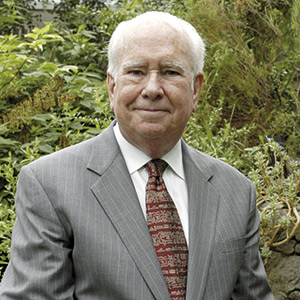BIO
Prof. Harold A. Mooney, Paul S. Achilles Professor of Environmental Biology at Stanford University (United States) is a key figure in conservation biology research. His work has alerted society to the threats posed by invasive species to the planet´s biodiversity, as well as building a bridge between two previously separate scientific areas; global climate change and the study of invasive species. His scientific output has merited worldwide recognition and he has received a number of major awards, including the Asahi Glass Foundation Blue Planet Prize in 2002. Professor Mooney´s publications include 35 books edited or co-edited, along with a score of articles in Science and Nature. In addition, his research has been cited in over 12,000 scientific papers since 1988, earning him a place in the ISI´s prestigious list of Highly Cited Researchers in Ecology and Environmental Sciences.
Prof. Peter H. Raven, president of the Missouri Botanical Garden (United States), one of the world’s premier centers for botanical research and training, and George Engelmann Professor of Botany at Washington University in St. Louis (United States ), is an eminent plant taxonomist and evolutionary biologist. An elected member of a number of learned international academies of science, he has authored over 450 papers in scientific journals and is editor or co-editor of 18 books, several of which have become basic textbooks in plant biology and environmental sciences. His scientific achievements have been amply recognized; among other honors, he was named “Hero of the Planet” by Time magazine, obtained the International Prize for Biology from the Japanese government and, in 2001, received the National Medal of Science from the hands of the President of the United States.
MORE+
CONTRIBUTION
Pioneer in global change research, the work of Prof. Harold A. Mooney has been instrumental in incorporating ecology into the study of global environmental issues, including climate change, biodiversity loss and the action of invasive species. From his involvement in the International Biological Program in 1970 to his position as co-chair of the scientific panel of the Millennium Ecosystem Assessment – a program bringing together 1,300 scientists from 95 countries to appraise the current state of planetary ecosystems – Mooney has championed the idea that biodiversity plays a vital role in the functioning of ecosystems and in maintaining the services they provide to humanity.
Harold Mooney is currently the president of Diversitas, an international program set up by intergovernmental organizations and non-governmental organizations like UNESCO that brings together scientists from all over the world to promote scientific research on biodiversity. Its goal is to generate accurate scientific information and predictive models of the status of biodiversity, and to find ways to support a more sustainable use of the Earth’s resources.
A life devoted to the study of plants, as president of the Missouri Botanical Garden (United States) for more than three decades, Prof. Peter H. Raven has made this institution a leading world center for the study and conservation of biological diversity. As we write, numerous scientists from the Missouri Botanical Garden are carrying out biodiversity conservation research projects in places like Argentina, Bolivia, Chile, China, Madagascar, Nicaragua, Tanzania, Peru, Ecuador and Vietnam. These include such major initiatives as the classification of flora in Peru, the Venezuelan Guayana, China and Mesoamerica (in this last case, the most extensive publication of its kind in the Spanish language). During his tenure at the Garden, Raven has been responsible for founding the Center for Conservation and Sustainable Development, which operates on an international; scale, and the Center for Plant Conservation, an independent body dedicated to preventing the extinction of America’s native flora, has moved to the Garden.
As an evolutionary biologist, Peter Raven is the author of key contributions in the biological sciences field; among them the co-evolution concept – the evolution of two unrelated species that nonetheless maintain an intimate ecological relationship – which he formulated on the basis of his studies into butterflies and the plants they feed on.

